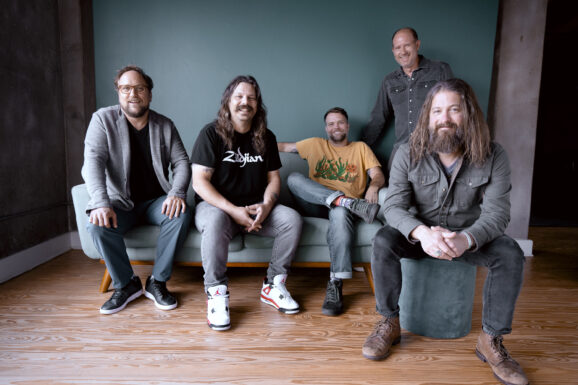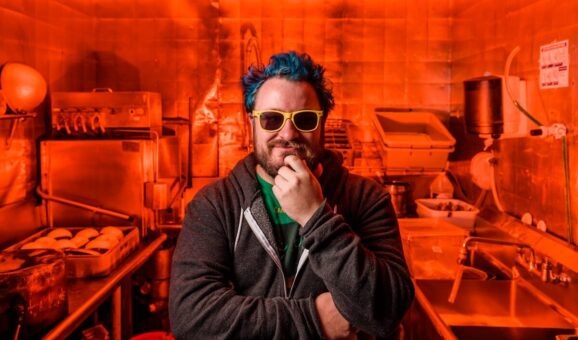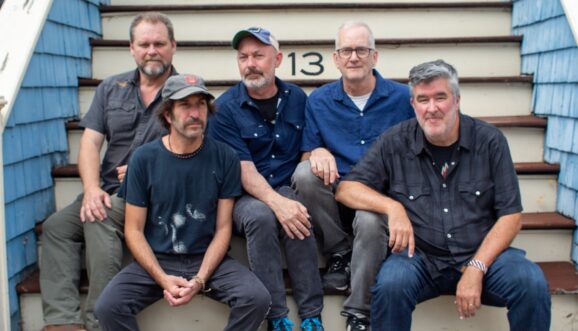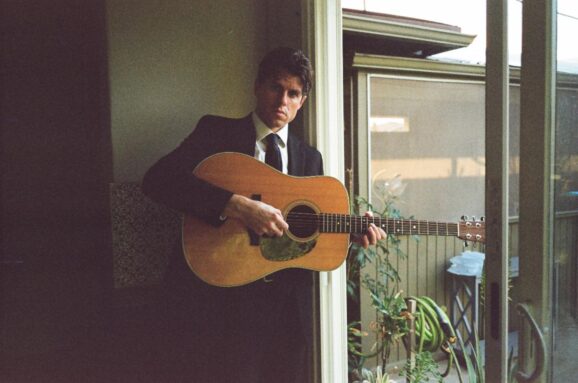Brett Anderson, frontman for The London Suede, seems relaxed during a recent Zoom video call from his home in Somerset, England – but his laid-back demeanor contrasts sharply with the edgy persona he presents on his band’s latest album, Autofiction (out September 16th via BMG).
“I describe it as our punk record,” Anderson says of Autofiction. “That doesn’t mean it’s a punk record. It means it’s our punk record. It’s the punk sensibility through the lens of Suede. I think it’s a very exciting record for us to be making at this stage in our career.”
This is the band’s ninth studio album, and it comes nearly thirty years after their debut, Suede (1993), established them as one of the leaders in the Britpop scene. With Autofiction, they prove they’re still as exuberant as they were when they first emerged – though Anderson’s lyrics reveal a certain wistful maturity.
“I wanted the record to be about vulnerability, strangely enough – which is quite an odd thing because it’s [sonically] quite brash – quite a loud record,” Anderson says, “but it’s the vulnerability that I think makes it interesting. I wanted it to be from the point of view of a 55-year-old man. Middle age, strangely, despite all the clichés, contains quite a lot of self-doubt and anxiety that you don’t really have when you’re in your twenties. I wanted to reflect that within the framework of these punky, live-sounding songs.”
Anderson and his bandmates actually finished a version of Autofiction before the COVID-19 pandemic swept the world. When emergency lockdowns were instituted in the U.K., the band used that downtime to write even more songs. In retrospect, Anderson feels this was a blessing. “The record was made much, much stronger by that whole process,” he says. “I think sometimes it’s that ‘turning crisis into opportunity’ trope, isn’t it?”
This situation also allowed the band to approach their songwriting from a completely different angle. “It’s about tearing up our own rule book. It’s about burning it down to the stubble and starting again. I think sometimes you need to do that,” Anderson says. “You need to access that sense of excitement about what you’re doing that can almost only come when you first start.”
In truth, though, Anderson was uninhibited from the moment he first started writing songs forty years ago, when he was in his mid-teens. “Looking back on it, I was pretty reckless, really, because I wasn’t really a musician,” he says. “I never have been a musician, I’ve got to be honest. I’m a faker. I can’t tell you what a C sharp is, and I don’t care. I quite like that. I don’t like musicians that are too muso. I think that’s missing the point. The only point of pop music, or any music, is whether it’s good. And that can be made by a complete fucking idiot who doesn’t know what he’s doing, or it can be made by a musical genius. It doesn’t really matter.”
Anderson came to this realization soon after the band formed in London in 1989: “It was annoying that Suede couldn’t sound like the hit bands of the time – and after a while, you realize that’s a strength. You only need to sound like yourself. I like bands that sound like they can only make one music, and that’s their own music.”
The London Suede’s unique angular-yet-melodic sound certainly connected with listeners: with hits such as “Animal Nitrate,” “Stay Together,” “Beautiful Ones,” they became one of the most popular bands in Britain in the 1990s, and have remained beloved ever since.
Even so, “I never really felt like a fully-fledged member of the music industry,” Anderson says. “I always feel like we’re in transit, like we’re heading somewhere but we’re never quite there yet. I think that’s quite a good state of mind, because I never feel satisfied with what we’ve done. I never listen back [to Suede songs] and think, ‘Oh, that’s perfect.’ I think as soon as you arrive at that point, there’s a kind of artistic death in that.”
In fact, Anderson says, he’s always striving for a certain imperfection, “Flaws are what give you personality. All my favorite art is slightly flawed,” he says. “I’m not a perfect singer. I’m not a perfect musician. I’m not able to sing in that perfect pop style, [but] I don’t even really like good voices. They don’t interest me. I like broken, bad voices. I sometimes think my voice isn’t broken and bad enough. I’d like to have a bit more rough edges.”
As a result, when Anderson creates his vocal melodies, “I’m stretching my voice. I’m trying to find that sweet spot between it being unlistenable and it being boring – there’s a sweet spot there where you’re using your voice in an interesting way.”
With a laugh, he describes how this approach can go awry, though: “Often, my wife will overhear me writing and she’ll be like, ‘What the fuck was that all about?’ Me shrieking. It’s quite unmusical, in a funny sort of way, and then I turn it into music later.”
Beyond paying close attention to the sound of his voice, Anderson also puts a lot of care into the messages he’s trying to convey with his lyrics, which are often oblique yet poetic. “Generally, I’ve always disliked music and art that’s too obvious. I always come at it from a slightly slanted point of view,” he says.
Anderson’s enthusiasm for finding new and innovative ways to make music is, he says, what drives him to continue. “I love creating. It’s a real challenge,” he says. “And why not create? We’re not here for very long on this Earth, and I don’t see the point in wasting your time. And I like to try and make the world a slightly better place, in my own tiny little way.”
Given their hitmaking history, it’s safe to say that The London Suede have brought more than a small amount of joy to listeners. But Anderson says his expectations for the band are modest these days, because “I don’t think we’ll ever achieve the success that we had in the past. That just isn’t going to happen because we’re not part of the mainstream anymore. It doesn’t matter if we make the greatest record ever made. We’re too old. We’re beyond that stage. But the funny thing is, it’s really artistically quite an exciting point when we suddenly realized that we could do what we wanted, as long as it was good.”
And with that in mind, Anderson has a simple wish for the fans who’ve stuck with the band and will give Autofiction a listen: “I’d like them to come away saying, ‘I fucking love that.’ That’s what I want.”








